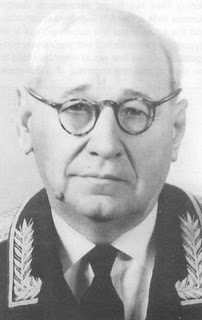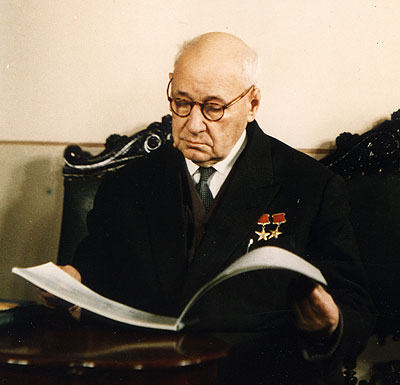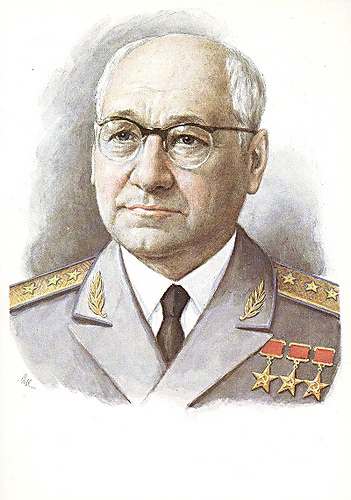<Back to Index>
- Aircraft Designer Andrei Nikolayevich Tupolev, 1888
- Playwright Johann Christoph Friedrich von Schiller, 1759
- Leader of the Reformation Martin Luther, 1483
PAGE SPONSOR



Andrei Nikolayevich Tupolev (Russian: Андрей Николаевич Туполев; November 10, 1888 – December 23, 1972) was a pioneering Soviet aircraft designer.
During
his career, he designed and oversaw the design of more than 100 types
of aircraft, some of which set 78 world records. In recognition of his
work, he was made an honorary member of Britain's Royal Aeronautical Society and the American Institute of Aeronautics and Astronautics. He was honoured in his own country by being made an academician of the Russian Academy of Sciences (1953), Colonel-General (1968), and three times a Hero of Socialist Labor (1945, 1957, 1972). Tupolev was born in the village of Pustomazovo (Russian: Пустомазово), near the city of Kimry, Tver region, Russia. Andrei was the sixth of seven children born to his parents. After first being educated at home, he studied at the Gymnasium in
Tver and graduated in 1908. He then applied for courses at two Russian
universities and was accepted at both: Imperial Moscow Technical School
(IMTU Russian: ИМТУ) and the Institute of Railway Engineers. He accepted the place at IMTU. In 1909, he began studying aerodynamics under the Russian aviation pioneer N.E. Zhukovski. During this time he built one of the world's first wind tunnels which led to the formation of an aerodynamic laboratory at IMTU. In
1911 he was accused of being involved with revolutionaries and
arrested. He was later released on condition that he stay at his family
home in Pustomazovo and was only allowed to return to IMTU in 1914. He
completed his studies in 1918 and was awarded the degree of
Engineer-Mechanic when he presented his thesis on the development of seaplanes. By
1920 the IMTU had been renamed the Moscow Higher Technical School
(MVTU) and Tupolev was teaching a course there on the basics of
aerodynamic calculations. Tupolev was a leading light of the Moscow-based Central Aero and Hydrodynamics Institute (TsAGI; Russian: Центральный аэро-гидродинамический институт; ЦАГИ) from 1929 until his death in 1972. The Central Design Office or TsKB (Russian: Центральное конструкторское бюро; ЦКБ) based there produced bombers and some airliners,
which in the years before World War II were based partially, especially
in his 1930s era designs, on the all-metal aircraft design concepts
pioneered by Hugo Junkers.
As the number of qualified aircraft designers increased, Tupolev set up
his own office, producing a number of designs designated with the
prefix ANT (Russian: АНТ) from his initials. However, in 1937, Tupolev was arrested together with Vladimir Petlyakov on trumped up charges of plotting a "Russian Fascist Party." In 1939, he was moved from a prison to an NKVD sharashka for aircraft designers in Bol'shevo near Moscow, with many ex-TsAGI people
already set to work. The sharashka soon moved to Moscow and was dubbed
"Tupolevka" after its most eminent inmate. Tupolev was tried and
convicted in 1940 with a ten year sentence, but was released in 1944
"to conduct important defence work." (He was not to be rehabilitated fully until two years after Stalin's 1953 death.) Tupolev headed the major project of reverse engineering the American Boeing B-29 strategic
bomber. The USSR had repeatedly asked, and been denied, lend-lease
B-29s. Using three machines which landed in Siberia after bombing Japan
in 1945, Tupolev succeeded in replicating the world's first nuclear
delivery platform down to trivial detail. Moreover, he got it into
volume production, with crews fully trained in time for the 1947 May
Day parade. The copy was designated Tu-4, with many subsequent Tu aircraft having the number 4 in their designations. By
the time of his rehabilitation in 1955, Tupolev had designed and was
about to start testing his unique turboprop strategic bomber, theTu-95. In the years to come, he beat off able competition from Vladimir Myasishchev and his M-4 series of jet-powered strategic bombers. This was in part thanks to Tupolev's close rapport with Nikita Khrushchev who had denounced Stalin's terror, a victim of which Tupolev had been. At about the same time, Tupolev introduced into service the world's second jet airliner, the Tu-104.
The aeroplane was the first jet transport to stay in uninterrupted
service, and the only one in service anywhere in the world for two
years until late 1958. It was followed by a series of Tu passenger
jets, including the supersonic Tu-144, designed by Tupolev's son Alexei Tupolev (1925–2001). After
Khruschev's removal from office in late 1964, the ageing Tupolev
gradually lost positions at the centres of power to rivals. Though the
prestige Tu-144 programme enjoyed top level support until 1973, as did
the important Tu-154, these positions were never recovered, being largely taken up by Ilyushin. To his contemporaries, Tupolev was known as a witty but crude master of mat (a
rapid-fire Russian male-speak infused with obscenity) who invariably
and energetically insisted on fast and adequate technical fixes at the
expense of scholastic ideal solutions. A hallmark of his was to get an
aeroplane into service very rapidly; then began an often interminable
process of improving the shortcomings of the "quick and dirty" initial
design. To his competitors among the Soviet aircraft design community,
he was known above all as politically astute; a shrewd and unforgiving
rival. Tupolev was buried in the Novodevichy Cemetery in Moscow.